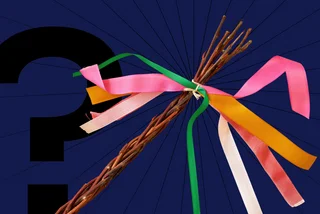Blank pieces of paper are being stuck to store fronts in Prague and throughout the Czech Republic, anywhere the word “Russian” appears. As their home country engages in a brutal invasion of Ukraine, Russians in Czechia fear being stigmatized and blamed for the actions of their government.
Stories are emerging of graffiti scribbled on Russian shop windows calling the owners “occupiers” or worse. Shops are closing for business as a result of customer boycotts; Russian stores are usually popular with Czechs as well as Russians, Ukrainians, Georgians and other minority groups in the Czech Republic.
Along with fears that the cessation of usual trade with Russia could lead to shortages of the types of goods sold in such stores, there’s sadness among the Russian community that political events are being blamed on ordinary people; and anger that the actions of Russian President Vladimir Putin are bringing shame on Russians living abroad.
Ukrainian flags are appearing throughout Prague, and the opportunity to use such gestures of solidarity to also criticize Russia isn’t being missed. The street plaque for “Russia street” in Prague’s Vinohrady district was taped over with a Ukrainian flag today; another small gesture adding to the general sense of hostility towards Russia in the Czech capital.
Russians living in Prague told me how recent events have come as a shock; not just to Russians abroad, but also their family and friends back home.
“My family in Moscow are shocked,” she Anna G. “They didn’t expect to see another war."
"It’s especially sad because it’s a war between two Slavic countries, which share very close social and cultural links," said Anna T., another Russian living in Prague. "Almost everyone in Russia knows someone who lives in Ukraine, and vice versa.”
The Russian community abroad is understandably concerned about the effects of the war on their nearest and dearest. But there is also cause for concern for their own futures abroad. “I don’t see much future for Russians coming to Europe at the moment," said Anna G.
"It’s so sad, because as a people, Russians are against the war. It will cause bad blood between our people and affect relationships for a very long time," said Anna T.
This is no surprise given the closure of EU airspace to Russian aircraft. The Czech government has meanwhile stopped accepting applications for visas from Russians; the decision won't impact those Russians already in the country, but Interior Minister Vit Rakušan has said that they will face "detailed security checks."
Rakušan pushed for the EU as a whole to stop issuing entry visas to Russians, saying that the Czech Republic’s position on the matter is being undermined by Russians’ ability to obtain Schengen visas elsewhere. But the EU does not, so far, appear receptive to the suggestion.
Rakušan admitted that such moves would harm people opposed to Putin’s actions living in Europe, arguing that in order to be effective, sanctions have to hurt. But he also condemned violence and bullying towards Russians living in Czechia, with particular criticism for reported abuse of Russian children in schools. “Let’s not bully Russians who live in the Czech Republic,” he urged.












 Reading time: 2 minutes
Reading time: 2 minutes 






























